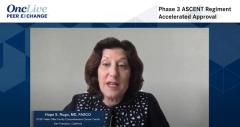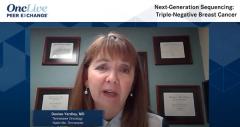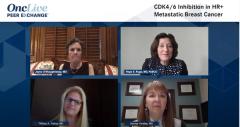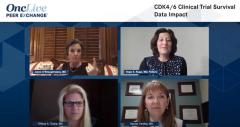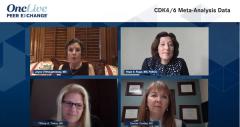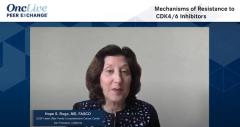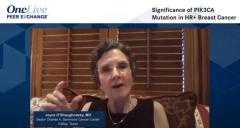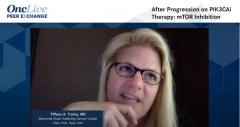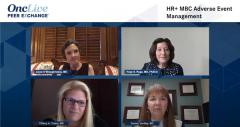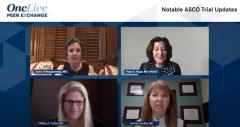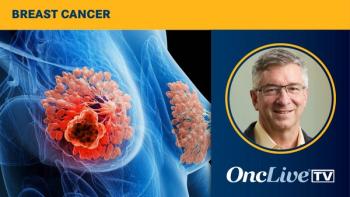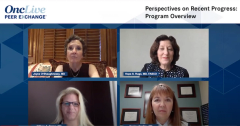
Notable ASCO Trial Updates
Episodes in this series

Joyce O’Shaughnessy, MD: I just want to go around. If anybody wants to make a final statement about anything you found from ASCO [American Society of Clinical Oncology Annual Meeting] that was particularly compelling or practice changing.
I guess I can start. I’ll mention the big KEYNOTE-355. Hopefully that will become a standard of care for us. We can now use gemcitabine and carboplatin-pembrolizumab once it’s available to us. We’ll await the survival data because that is really important with the atezolizumab and the nab-paclitaxel. We do want to see survival from KEYNOTE-355. I will mention that, and I will let others mention other studies that were compelling to you. How about you, Tiffany?
Tiffany A. Traina, MD: I similarly think that KEYNOTE-355 is a great opportunity for us to have other chemotherapy partners together with another checkpoint inhibitor. I’m really excited to see consistent data from the PARP inhibitors beyond the germline mutation carriers. Some of it could be very quickly actionable. If you think about doing…panels on tumor that pick up a breast cancer mutation, and we’re uncertain if it’s somatic or germline, it may allow for use of elaborate in that setting.
Joyce O’Shaughnessy, MD: Thank you. How about you, Denise?
Denise Yardley, MD: KEYNOTE-355 just keeps resonating, partly because of that resounding message of immunotherapy in a host of other solid tumors. So many of my partners have long been raving about the role of immunotherapy in various solid tumors. Where we’ve really struggled in the breast cancer arena of wanting to embrace it. I don’t think there is a patient that hasn’t heard of it and comes in. It was always a message of, “There is a signal but not a clear signal.”
We embrace the IMpassion data and now the KEYNOTE-355. There that clear evidence of that role, and we hope that role expands to other breast cancer subtypes as well. I like that. I’ve done some of those talks. Hope, as you know, sequential single agents and combination chemotherapy were the hot items. The pendulum shifted back to sequential single agents. When I look at chemotherapy or endocrine therapy, that was the mainstay for triple-negative and sequential single-agent chemotherapy and sequential single-agent hormonal monotherapy.
Now we’re back at embracing what I think is a platform of excellent science and unraveling some of these key pathways to going back and embracing combination therapies. They’re combinations now, not with combination endocrine therapy but combination endocrine therapy with a biologic partner, based on a very well-worked-out platform of mitigating resistance in many circumstances.
The same with triple negative is looking at chemotherapy in a combination with immunotherapy and bringing in the immune systems to really increase the efficacy of those backbone agents, which results in improvements in patient care and outcomes. I think that message from multiple presentations at ASCO this year in the endocrine therapy triple negative arena existed.
Joyce O’Shaughnessy, MD: Thank you very much. How about Hope?
Hope S. Rugo, MD, FASCO: It’s hard to add onto all the great comments that were made. Clearly KEYNOTE-355 is very helpful for us. Looking at different subsets with endocrine therapy and CDK4/6 inhibitors are helpful. We really need to understand who benefits, who doesn’t benefit, and who needs more therapy. As Denise was mentioning, we’re looking at additional combinations. We don’t want to treat everybody. The cost of therapy will be just continually expanding—not just financial costs but toxicity as well.
At ACR [American College of Rheumatology Convergence 2020], we presented data with abemaciclib, pembrolizumab, and aromatase inhibitor therapy. In that trial—which was a small trial, under 30 patients—we saw pulmonary toxicity. We didn’t really know if it was actually the triplet drugs or whether it was the fact that patients had very bad disease. Regardless, we also saw worsening of liver enzymes as well. It’s an interesting thing. As we start adding on drugs, I think we have to be careful.
I’ve been interested in the HER2 [human epidermal growth factor receptor 2]–positive group. There are a ton of trials adding immunotherapy. This is a group of patients who do really well. We saw the adjuvant HER2 study at ASCO this year, where they gave the overall survival at 3 years was something like 96%, and PFS [progression-free survival] was in the 90s. It was just unbelievable. We don’t want to be throwing it at on everybody. Our task of moving forward is to understand who benefits or not.
My big interest is that if immunotherapy works for a subset of patients in the metastatic setting, we’ve got to move this faster into earlier-stage disease and understand who benefits. We need to be experts on managing and understanding toxicity, time courses, and identifying toxicity.
Lastly, at ASCO this year, we didn’t talk about the long-awaited data of randomizing patients with de novo metastatic disease to surgery, intensive locoregional therapy surgery and radiation vs not. Fascinating data suggest that if you take a long time off in patients with triple-negative disease to do local therapy, it’s worse for them than if you continue therapy. I think those are really important data for us moving forward. Those are probably the most important data for me out of that SWOG trial that was presented and was nicely discussed in the plenary session.
I do think it’s still hard to know what to do with HER2-positive patients who may have long-term disease control, the de novo metastatic patients. They may benefit from surgery, and certainly patients who have a lot of local disease may benefit from surgery in terms of quality of life. But we need not be telling patients we can cure them for metastatic disease by doing local surgery and radiation.
Joyce O’Shaughnessy, MD: Yeah, that’s good. Thanks for bringing that up, Hope. That was a superimportant plenary discussion at ASCO, and it is very useful. I want to thank you again for really a rich and deep discussion of some really key data sets. It’s always fun talking with you guys and having a chance to vet the new data. Thank you very much to our listeners here today. We hope as a group that you have found this informative and useful for your practice. Thank you very much.
Transcript edited for clarity.


